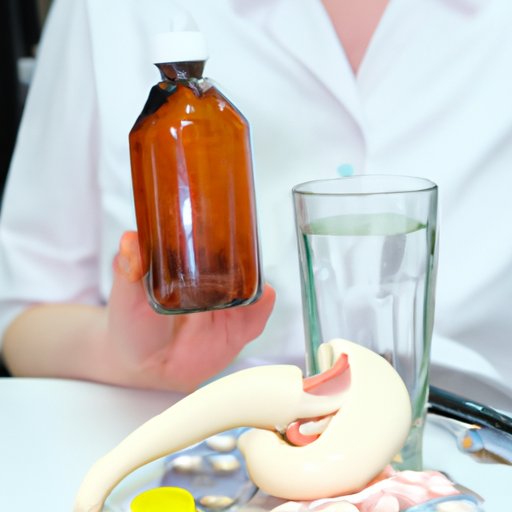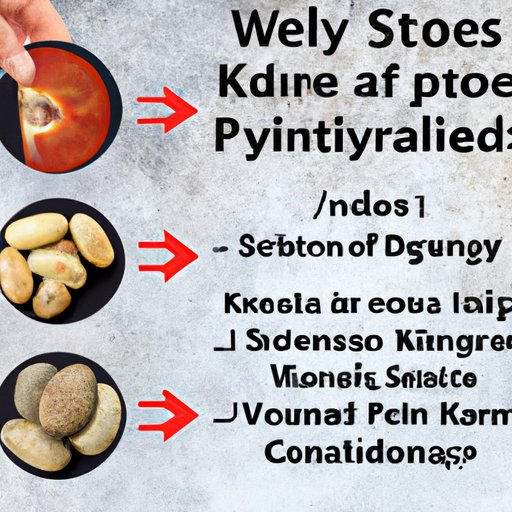
I. Introduction
Kidney stones are a common medical condition that can cause severe discomfort and pain. If you have ever had a kidney stone, you know how unbearable the pain can be. In this article, we will explore how to identify whether you passed a kidney stone. We will discuss the symptoms, home remedies, diagnosis, treatment, prevention, and facts and statistics about kidney stones.
II. Symptoms of Passing a Kidney Stone
The most common symptoms of passing a kidney stone include severe pain in the lower back, nausea, and urge to urinate. The pain can be so intense that it may cause nausea and vomiting. If you are experiencing these symptoms, it may be a sign that you have a kidney stone. However, not all back pain means you have a kidney stone. Back pain can be caused by a variety of conditions such as a muscle strain, spinal problems, or urinary tract infection. To identify if the pain is caused by a kidney stone, you may need to see a doctor for diagnosis.
It is important to seek medical attention if you are experiencing extreme pain or discomfort. Your doctor can help determine the cause of your symptoms and provide treatment if necessary. In some cases, if left untreated, kidney stones can lead to more severe complications such as blockages in the urinary tract. Therefore, it is essential to be aware of your symptoms and seek medical assistance if needed.
III. Home Remedies for Passing a Kidney Stone
There are several natural remedies that can help relieve discomfort caused by kidney stones. Drinking plenty of water is essential for flushing out the kidneys and helping the stone move through the urinary tract. You should aim to drink enough water so that your urine is clear or light yellow. Hot compresses can also help relieve pain and relax the muscles in the urinary tract.
Reducing the risk of further kidney stone development includes making dietary and lifestyle adjustments. Reducing sodium, animal protein, and oxalate-rich foods like spinach, nuts, and chocolate can help prevent kidney stones from forming. Consuming more fruits and vegetables and maintaining a healthy weight can also reduce the risk of kidney stones.
If you are unsure about which foods to consume or avoid, it may be beneficial to speak with a registered dietitian who can assess your dietary needs and provide personalized recommendations.
IV. Diagnosis and Treatment of Kidney Stones
If you suspect that you have a kidney stone, you should make an appointment with your healthcare provider. Your doctor may perform imaging tests to diagnose the stone’s size and location. Imaging tests can include CT scans, MRIs, or ultrasounds. If the stone is small enough, it may pass through the urinary tract naturally. However, larger stones may require medication or surgical intervention to remove them.
If you have an infection or are experiencing severe pain, your doctor may prescribe pain medication or antibiotics. In some cases, surgery may be necessary to remove the stone. Surgery can include ureteroscopy, extracorporeal shock wave lithotripsy (ESWL), and percutaneous nephrolithotomy (PCNL).

V. Dietary Changes to Help Prevent Kidney Stones
Preventing kidney stones may include making lifestyle changes such as maintaining a healthy weight and staying hydrated. Drinking enough water is essential to flush out the kidneys and help prevent the formation of kidney stones. Individuals should aim to drink at least eight glasses of water per day.
If you are at risk for kidney stones, you may need to make dietary changes. Consuming too much sodium, animal protein, and oxalate-rich foods can increase your risk of developing kidney stones. To help prevent them, you may need to consume more fruits and vegetables while reducing the amount of processed foods in your diet.
Foods to avoid or consume in moderation include spinach, beets, rhubarb, nuts, chocolate, tea, and coffee. These foods are high in oxalate, a compound that can contribute to the formation of kidney stones. By making these dietary changes, you can decrease your risk of developing kidney stones.
VI. Frequently Asked Questions About Kidney Stones
Here are some commonly asked questions about kidney stones:
1. What causes kidney stones?
The most common cause of kidney stones is an imbalance in the urine’s mineral and acid levels, leading to the formation of crystals. Genetics, diet, and dehydration can also contribute to kidney stones’ development.
2. Can you pass a kidney stone without knowing it?
It is possible to pass small kidney stones without knowing it. Stones that cause symptoms often cause severe pain, nausea and vomiting.
3. How can I prevent kidney stones?
To help prevent kidney stones, you should drink plenty of water, avoid consuming salty foods, and reduce your animal protein intake. Consuming a diet high in fruits and vegetables and maintaining a healthy weight can also help prevent kidney stones.
4. When should I seek medical attention for a kidney stone?
You should seek medical attention if you are experiencing severe or worsening symptoms such as extreme pain, fever, or difficulty urinating.
5. Does drinking beer cause kidney stones?
Drinking alcohol can contribute to dehydration, which can increase the risk of kidney stones’ development. However, drinking beer in moderation is unlikely to cause kidney stones.
VII. Stories of Overcoming Kidney Stones
Overcoming kidney stones can be a challenging experience. Hearing from others who have successfully navigated this medical condition can provide inspiration and hope for those experiencing the same journey. There are many stories of individuals who have successfully passed kidney stones through natural remedies and medical intervention. These stories serve as a reminder that with the right treatment, it is possible to recover from kidney stones.
VIII. Facts and Statistics about Kidney Stones
Kidney stones are prevalent in both men and women and can occur at any age. However, they are most common in individuals between the ages of 30-50. In the United States, approximately 1 in 10 people will experience kidney stones at some point in their lives, with men experiencing kidney stones more often than women. Kidney stones are prevalent worldwide, affecting approximately 1 in 11 individuals.
IX. Conclusion
Kidney stones can be a very painful and uncomfortable experience. Understanding the symptoms, prevention, and treatment of kidney stones can help alleviate symptoms and minimize complications. By making lifestyle and dietary changes, you can reduce your risk of developing kidney stones and improve your overall health. If you suspect you may have a kidney stone, it is important to seek medical attention promptly. With proper diagnosis and treatment, most kidney stones can be successfully managed.




